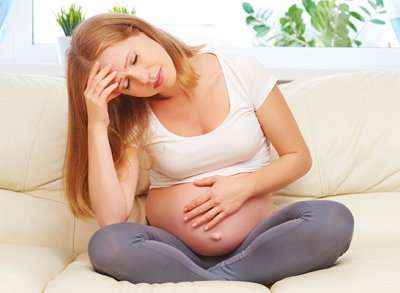Fatigue During Pregnancy

Contents:
- The Cause of Fatigue
- When Fatigue is a Symptom of Anemia?
- How to Cope With Fatigue?
- In What Case there is a Need to Consult Your Doctor?
Fatigue in Pregnancy
During the course of pregnancy, many women feel more tired than they used to before. This is especially obvious during the first and the last months of pregnancy. This is the time when the organism of a future mother is actively producing a big amount of hormones and goes through various changes that are meant for the course of pregnancy to go smoothly and preparation for labor.
The Cause of Fatigue
During the first months of pregnancy, your organism produces lots of progesterone. A high level of this hormone may make you feel sleepy, weal and cause a constant feeling of fatigue. There is also more blood in your organism now. This blood is necessary to keep the baby alive and provide him or her with all necessary nutrients. Because the amount of your blood is increased the load on heart and other organs also increases.
Psychological and physiological changes that occur in your organism during the course of pregnancy lead to psychological and emotional stresses. These stresses may also be a reason for you to feel very tired. During the last months of pregnancy, the load on the organism that’s caused by additional weight (your baby) together with the weight you yourself gained also causes fatigue.
Besides, on this stage of pregnancy, the following problems, that often occur in cases of future mothers, may also cause fatigue:
- sleep disorder (insomnia) or problems trying to fall asleep;
- frequent urinating during the nighttime period;
- leg cramps that occur usually at night and wake a woman up;
- epigastric burning;
- anemia, especially, iron deficiency anemia.
When Fatigue is a Symptom of Anemia?
Fatigue may be a symptom of anemia, especially, the symptom of iron deficiency anemia (IDA). Approximately half of all pregnant women suffers from iron deficiency anemia. The organism of a future mother needs iron in order to produce hemoglobin – a substance in red blood cells that allows the cells to carry oxygen to the tissues of the mother and her baby. Your need in iron is increased during the pregnancy because your baby also needs it and also because the overall amount of blood in your organism is increased.
Except for fatigue other symptoms of anemia include:
- dyspnea, heavy breathing;
- fast or not regular heartbeat;
- feeling tired or weak;
- skin turning pale;
- feeling giddy.
How to Cope With Fatigue?

In order to avoid fatigue during pregnancy you need:
- If there is an opportunity, you need to have a rest during the day. At least during the time when you have a lunch break. You’d better lie down and have a nap.
- When you are at work, you need to make breaks frequently, this way you won’t overwork and will have a chance to recover strength.
- You need to go to bed early, especially, if you wake up during the nighttime. You need to go to bed as soon as you start feeling fatigue. Do not sit till small hours!
- Try not to drink anything 2 hours before you go to bed. This way you’ll avoid a necessity to go to the toilet often during the night. However, during the day, you need to necessarily drink a lot of water. A lack of water may contribute to fatigue!
- If you suffer from epigastric burning, you need to eat for the last time (on the day when it occurs) several hours before you go to bed.
- In order to avoid leg cramps at night you need to do muscle stretching exercise before going to bed.
- Do simple physical exercises. If you’re not forbidden doing them, you need to do them, at least, 2 hours per week (approximately 25-30 hours per day). Even such exercises like walking can improve your mood, make fatigue go away and increase the level of your energy. Ask your doctor what exercises are safe for you to do and for how long you can do them. Doing prenatal yoga is really good for making fatigue go away.
- Avoid stressful situations. Nervous overstrain is the first step to fatigue.
- Try avoiding noisy and crowded event by visiting which you may get more than tired. Instead visiting them, you may spend time doing something that you enjoy and something that makes you relax.
- Use such methods to relax as deep breathing or meditation when you feel that you need to relax a bit and have a rest.
- Divide your DIY between your family members. Ask your husband, children or even friends to help you doing DIY that, as it is known, can really be tiresome and cause a strong fatigue.
- Pay attention to your diet. If there is a possibility, you need to eat only healthy foods, especially the ones, that contain lots of protein and iron.
- Take vitamins for pregnant women. If you have a risk of anemia, then, your doctor should necessarily prescribe to you additional drugs containing iron.
In What Case there is a Need To Consult Your Doctor?
A little feeling of fatigue is normal for pregnant women, especially, in the beginning and in the end of pregnancy.
However, you should necessarily consult your doctor if you feel the following:
- a sudden fatigue;
- fatigue that doesn’t go away even after you’ve had a good rest;
- fatigue that goes on for several weeks, especially, if it is the 2nd trimester of pregnancy;
- depression or an inexplicable worry.
If you suddenly start feeling like eating uneatable stuff, like ice, dirt, paper or clay, you need to necessarily tell your doctor about it! Such a desire may be connected with a lack of iron. In this case, your doctor should tell you make a blood test. If it’s necessary he will also prescribe to you iron containing drugs.